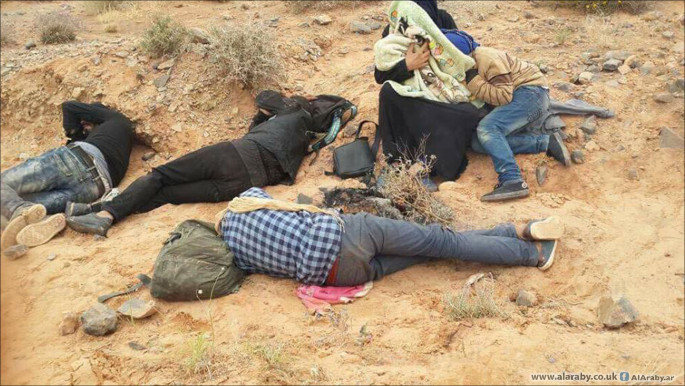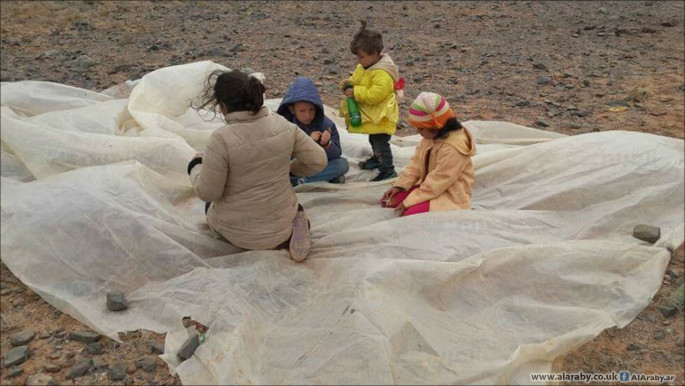
Refugee 'hot potato'
Earlier this week, Rabat and Algiers traded accusations over allegations that the refugees were forced to make the crossing attempt.
On Friday, Morocco accused Algeria of expelling the Syrian group across the frontier near the desert town of Figuig, suggesting a deliberate attempt to embarasss Rabat.
Algeria subsequently responded by denying the refugees originated from Algeria.
Neither country has agreed to take in the group of Syrian refugees.
The two nations summoned each other's envoys in the latest row between the neighbours, who have kept their shared 1,500 km land border closed since 1994.
Article continues below
'Sand War'
Since the 'Sand War' border disputes of the 1960s, Rabat and Algiers have shared a relationship fraught with tension, particularly over Western Sahara – a disputed former Spanish colony.
Morocco annexed the territory in 1975, however Algeria has supported and hosted the Polisario separatist group which is held in contempt by Rabat.
Dr. Abderrahim Esslimi, a Moroccan political analyst interviewed by The New Arab, accused Algeria of trying to deliberately "flood" Morocco with African and Syrian refugees to create tensions and destabilise its eastern neighbour.
But Saida Benhabiles, former minister of national solidarity and president of the Algerian Red Crescent told The New Arab the group of refugees are stranded on the Moroccan side, and not in the border region. In an angry tone she said: "We regret and strongly condemn the exploitation of this humanitarian tragedy for political purposes."
(Reporting by Hassan al-Ashraf, translation by Karim Traboulsi)
Syrian refugee infant is born stranded in the Sahara
In pictures: Syrian refugees are stranded in difficult conditions in a military zone between Morocco and Algeria, both of which are refusing to help
3 min read
Baby Zozfana was born in the no man's land between Algeria and Morocco [Al-Araby al-Jadeed]
Zouzfana, a Syrian baby girl, was born on Sunday night along the Algerian-Moroccan border near Mount Tagla in cruel weather conditions, with temperatures nigh on 40 degrees Celsius.
The mother went into a sudden labour immediately after she was brought to the border region. Zouzfana was delivered during a sandstorm without shelter, with the help of another refugee that conveyed instructions received via phone from aid workers in the town of Figuig, eastern Morocco.
They had been stuck there with 54 other refugees from the Idlib province in Syria. Their group includes many children and elderly people stranded between the Oued Zouzfana valley (after which the newborn seems to have been named) and Azaghdis near the border.
The ostensibly sudden arrival of these Syrians to this area has caused a diplomatic crisis between rival neighbours Algeria and Morocco, both of which have shown a reluctance to assist the stranded refugees, if not attempted to exploit them politically to embarrass each other.
No one knows yet what will happen to them, and they remain without proper shelter, food, and basic necessities despite some help from locals.
In the early hours of Saturday, Syrian refugees suddenly arrived in Figuig. The locals were at once surprised and curious, identifying the newcomers from their accents and their tired, ramshackle appearances, according to Omar Figuigi, a local of the oasis town near the Atlas mountains.
They knocked on the townspeople's doors, asking for assistance and shelter. "We don't need food and drink, we need to live in dignity, our country has been destroyed by the war Bashar al-Assad started," one of the women was heard saying according to Figuigi.
Locals like activist Hassan Benamara quickly provided food, drink and medicine to the refugees but they were later taken by the Moroccan authorities to a makeshift camp near the border, where they found themselves besieged by both Algerian and Moroccan border guards.
Now, the refugees are relying on food aid received from locals, but the aid has to come secretly because the area they are in is a military zone, according to Benamara.
"The refugees are in dire conditions. They have no tents and no blankets, in an area plagued by mosquitoes and snakes, not to mention high temperatures and frequent sandstorms," he told The New Arab.
Article continues below
The mother went into a sudden labour immediately after she was brought to the border region. Zouzfana was delivered during a sandstorm without shelter, with the help of another refugee that conveyed instructions received via phone from aid workers in the town of Figuig, eastern Morocco.
They had been stuck there with 54 other refugees from the Idlib province in Syria. Their group includes many children and elderly people stranded between the Oued Zouzfana valley (after which the newborn seems to have been named) and Azaghdis near the border.
The ostensibly sudden arrival of these Syrians to this area has caused a diplomatic crisis between rival neighbours Algeria and Morocco, both of which have shown a reluctance to assist the stranded refugees, if not attempted to exploit them politically to embarrass each other.
No one knows yet what will happen to them, and they remain without proper shelter, food, and basic necessities despite some help from locals.
Article continues below
Knocking on an oasis' doors
In the early hours of Saturday, Syrian refugees suddenly arrived in Figuig. The locals were at once surprised and curious, identifying the newcomers from their accents and their tired, ramshackle appearances, according to Omar Figuigi, a local of the oasis town near the Atlas mountains.
They knocked on the townspeople's doors, asking for assistance and shelter. "We don't need food and drink, we need to live in dignity, our country has been destroyed by the war Bashar al-Assad started," one of the women was heard saying according to Figuigi.
Locals like activist Hassan Benamara quickly provided food, drink and medicine to the refugees but they were later taken by the Moroccan authorities to a makeshift camp near the border, where they found themselves besieged by both Algerian and Moroccan border guards.
Now, the refugees are relying on food aid received from locals, but the aid has to come secretly because the area they are in is a military zone, according to Benamara.
"The refugees are in dire conditions. They have no tents and no blankets, in an area plagued by mosquitoes and snakes, not to mention high temperatures and frequent sandstorms," he told The New Arab.
Article continues below






 Follow the Middle East's top stories in English at The New Arab on Google News
Follow the Middle East's top stories in English at The New Arab on Google News


